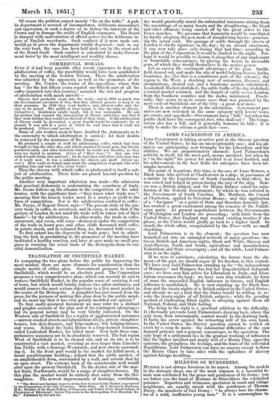LORD PALMERSTON IN AMERICA.
Loan PALMERSTON is taking an active part in the Slavery question of the United States ; he has an unexceptionable case ; and his ad- mirers are anticipating new triumphs for his Liberalism and his abilities. We are proportionately alarmed : Lord Palmerston's activity in itself, for the most part, means mischief; but when he is " in the right" his power for mischief is at least doubled, and his achievements in the best fields for enterprise have been tri- umphs inverted.
His point of departure, this time, is the case of Isaac Bowers, a Black man, who arrived at Charlestown in a ship ; in pursuance of a statute by the Legislature of South Carolina to that effect, he was seized and lodged in prison during the stay of the ship. Bow- ers was a British subject, and Sir Henry Bulwer asked for satis- faction of the Federal Government; by which he was referred to the Government of South Carolina. Mr. Matthew, the Consul at Charleston, applied to Governor Means ; and this application of a " foreigner " on a point of State and therefore domestic law, has created a great excitement among the remains of the Nullifi- cator party. At present negotiations between the Governments of Washington and London are proceeding ; with hints from the United States, that England may rescind existing treaties if she please, as the Union would gladly go back to a higher tariff. So stands the whole affair, recapitulated by the Times with no small chuckling.
Lord Palmerston is in his element : the question has now branched out into an entangled network of many questions—be- tween British and American rights, Black and White, Slavery and Anti-Slavery, North and South, agriculture and manufactures, Federalism and State sovereignty ; and all the while, Lord Palmer- ston is in the right.
If we were to vaticinate, calculating the future from the ele- ments of the past, we should augur ill for freedom in this contest. We have seen Lord Palmerston standing up for " the independence of Hungary," and Hungary has lost her long-cherished independ- ence; we have seen him active for Liberalism in Italy, and Abso- lutism reassumes the land ; we have seen him vindicate by force of arms the unassailed English influence in Greece, and English influence is annihilated. He is now standing up for Black free- dom and the treaty-rights of a British subject in the United States ; and already we see a hint that the States would be willing to re- voke the treaty-rights of all British subjects ; while the peculiar method of vindicating Black rights is arraying against them all National, Federal, and State feeling. The being in the right is a practical addition to the difficulty. It effectually prevents Lord Palmerston's drawing back, where the only issue from interminable contest would be his drawing back. It barbs his arrow against the retracting will of his own hand. In the United States, the Slavery question cannot be settled ab extra by a coup de main: the substantial difficulties of the case demand patience and a general concurrence in the operation. The only hope of a settlement lies in the gradual working of influences like the higher intellect and manly will of a Henry Clay, upon the opinions, the prejudices, the feelings, and the fears of the self-ruled Republicans. Lord Palmerston can have no success except to force the Henry Clays to take sides with the upholders of slavery against foreign meddling.


























 Previous page
Previous page